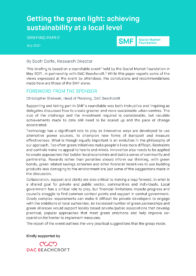Local authorities and the private sector have significant scope and influence to help the UK decarbonise on a local level. This briefing, based on an expert roundtable supported by DAC Beachcroft, assesses what role councils and businesses can play in reaching Net Zero and makes a series of recommendations for financing and delivering vital net zero projects in our communities.
Key points
- The built environment accounts for about 40% of the country’s total carbon footprint.
- While local authorities are directly responsible for just 2-5% of local emissions, it has been estimated that they can influence around a third of emissions in their area through leadership and place-making.
- Councils face considerable challenges in delivering net zero on a local level. Financial constraints and disconnect between central and local government remain a major issue.
- Private developers can play a key role in creating sustainable towns and cities, but more needs to be done to incentivise green construction.
Recommendations
- Local government should explore the potential of green bonds to finance investment in sustainable energy, transportation and building solutions, drawing on the success of Swedish municipal green bonds.
- Government should explore the potential role of construction and building carbon taxes and carbon pricing mechanisms to incentivise sustainable development.
- Local and central government should consider its own scope for driving sustainable construction through procurement rules and planning requirements. This includes demanding more of the construction sector in terms of quantifying the embodied carbon associated with development, and demonstrating efforts undertaken to minimise embodied carbon.
- Based on the principles of “mission-oriented innovation”, local authorities should set an ambitious but realistic target to address the “grand challenge” of decarbonisation.

Download the briefing PDF
Kindly supported by

